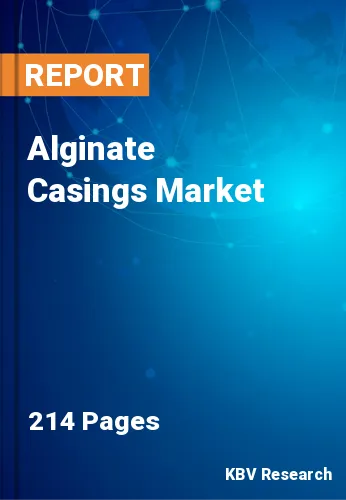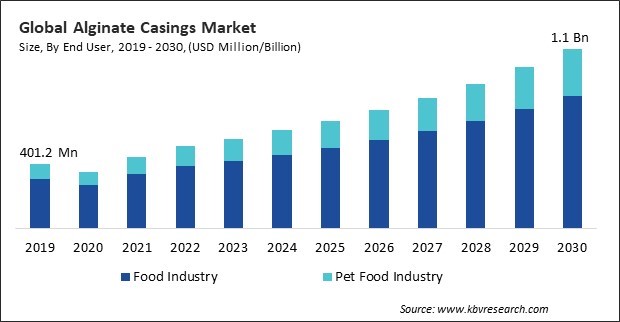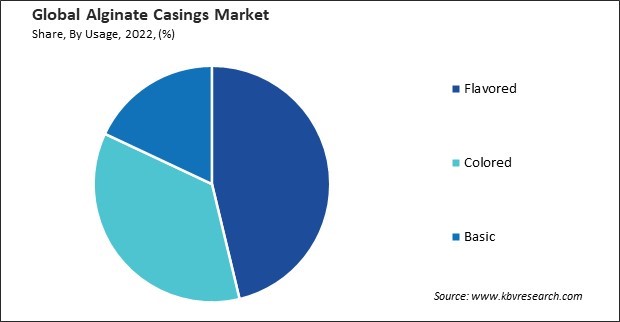
The Global Alginate Casings Market size is expected to reach $1.1 billion by 2030, rising at a market growth of 10.4% CAGR during the forecast period.
European consumers often demonstrate a strong preference for natural and sustainable products. Alginate, being derived from seaweed, aligns with these preferences. Thus, Europe region acquired 31.7% revenue share in the market. The growth in meat production in the EU may result in an increased demand for casings to meet the packaging needs of sausages and processed meat products. This, a viable alternative to traditional casings, could see expanded usage as the meat industry looks for diverse and sustainable packaging solutions.

It is biodegradable because they are derived from seaweed. This environmentally sustainable attribute attracts consumers who are environmentally aware and concerned with reducing plastic pollution and the ecological consequences associated with conventional casings. The production of alginate casings typically involves fewer resources than traditional casings made from synthetic materials.
Additionally, as per Invest India, the food processing industry in the country is among the biggest in the world, and by 2025–2026, it is projected to produce $535 billion. Likewise, as per the data released by the United States Department of Agriculture, according to the Brazilian Food Processors' Association (ABIA), the country’s food processing sector registered revenues of R$922.6 billion (US$171 billion) in 2021, an increase of 16.9 percent compared to 2020. Hence, these factors can boost the demand for the market.
However, the extraction of seaweed for alginate production involves harvesting practices that balance economic interests with environmental sustainability. Overharvesting or improper harvesting techniques can deplete seaweed resources, jeopardizing the long-term sustainability of the market. Striking a balance between harvesting for commercial purposes and ensuring ecological health poses a significant challenge. Thus, these factors can lead to a reduced demand for it in the upcoming years.
 Drivers
Drivers  Restraints
Restraints  Opportunities
Opportunities  Challenges
Challenges On the basis of end user, the market is divided into food industry and pet food industry. The food industry segment recorded 75.6% revenue share in the market in 2022. Changing customer preferences may influence its usage, such as an increasing need for natural and sustainable food ingredients.
Based on usage, the market is divided into halal, kosher, and others. In 2022, the kosher segment witnessed 30.7% revenue share in the market. This certified as kosher comply with Jewish dietary laws, making them suitable for consumption by individuals who observe these dietary restrictions.

Based on application, the market is segmented into meat, vegan, and fish. The meat segment held 66.38% revenue share in the market in 2022. A growing trend in food choices is toward more sustainable and healthful options. Alginate casings, plant-based and derived from seaweed, align with these consumer preferences.
On the basis of type, the market is divided into basic, colored, and flavored. In 2022, the colored segment witnessed 35.7% revenue share in the market. Colored casings can enhance the visual appeal of food products. Using vibrant colors can attract consumers and make the products visually appealing on store shelves.
Free Valuable Insights: Global Alginate Casings Market size to reach USD 1.1 Billion by 2030
By region, the market is segmented into North America, Europe, Asia Pacific, and LAMEA. In 2022, the Europe segment acquired 31.7% revenue share in the market. European consumers often demonstrate a strong preference for natural and sustainable products. Alginate, being derived from seaweed, aligns with these preferences.
| Report Attribute | Details |
|---|---|
| Market size value in 2022 | USD 513.41 Million |
| Market size forecast in 2030 | USD 1.1 Billion |
| Base Year | 2022 |
| Historical Period | 2019 to 2021 |
| Forecast Period | 2023 to 2030 |
| Revenue Growth Rate | CAGR of 10.4% from 2023 to 2030 |
| Number of Pages | 214 |
| Number of Tables | 430 |
| Report coverage | Market Trends, Revenue Estimation and Forecast, Segmentation Analysis, Regional and Country Breakdown, Porter’s 5 Forces Analysis, Company Profiling, Companies Strategic Developments, SWOT Analysis, Winning Imperatives |
| Segments covered | Usage, Type, Application, End User, Region |
| Country scope |
|
| Companies Included | FMC Corporation, Reiser, Kalle GmbH, Albert Handtmann Holding GmbH & Co. KG, ViskoTeepak Holding Ab Ltd, D2 Ingredients, LP, J. Rettenmaier & Sohne GmbH Co KG, Vaessen-Schoemaker B.V., Qingdao Hyzlin Biology Development Co., Ltd. Compañía Español, de Algas Marinas, S.A. |
By End User
By Usage
By Application
By Type
By Geography
This Market size is expected to reach $1.1 billion by 2030.
Rising preference for natural ingredients are driving the Market in coming years, however, Raw material availability and cost fluctuations restraints the growth of the Market.
FMC Corporation, Reiser, Kalle GmbH, Albert Handtmann Holding GmbH & Co. KG, ViskoTeepak Holding Ab Ltd, D2 Ingredients, LP, J. Rettenmaier & Sohne GmbH Co KG, Vaessen-Schoemaker B.V., Qingdao Hyzlin Biology Development Co., Ltd. Compañía Español, de Algas Marinas, S.A.
The expected CAGR of this Market is 10.4% from 2023 to 2030.
The Halal segment is leading the Market by Usage in 2022, there by, achieving a market value of $614 Million by 2030.
The North America region dominated the Market by Region in 2022, and would continue to be a dominant market till 2030; there by, achieving a market value of $394.7 Million by 2030.
Our team of dedicated experts can provide you with attractive expansion opportunities for your business.
